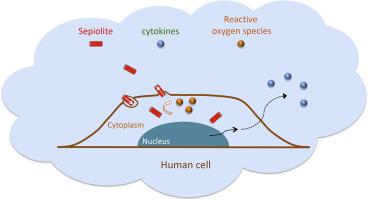当前位置:
X-MOL 学术
›
Appl. Clay. Sci.
›
论文详情
Our official English website, www.x-mol.net, welcomes your feedback! (Note: you will need to create a separate account there.)
Responses of human cells to sepiolite interaction
Applied Clay Science ( IF 5.6 ) Pub Date : 2020-09-01 , DOI: 10.1016/j.clay.2020.105655 Sandrine Ragu , Elodie Dardillac , David Adame Brooks , Fidel Antonio Castro-Smirnov , Pilar Aranda , Eduardo Ruiz-Hitzky , Bernard S. Lopez
Applied Clay Science ( IF 5.6 ) Pub Date : 2020-09-01 , DOI: 10.1016/j.clay.2020.105655 Sandrine Ragu , Elodie Dardillac , David Adame Brooks , Fidel Antonio Castro-Smirnov , Pilar Aranda , Eduardo Ruiz-Hitzky , Bernard S. Lopez

|
Abstract We showed that sepiolite can transfer DNA into mammalian cells, opening alluring avenues for biothechnological and biomedical applications. Importantly, mammalian cells spontaneously internalize sepiolite, facilitating the spontaneous transport and delivery of bound molecules, but increasing the risks of potential toxicity. In addition, the fibrous nature of sepiolite raised health concerns about possible asbestos-like effects, especially because sepiolite can transfer DNA into bacteria through Yoshida effect. In spite that extrapolations from bacteria to mammalian cells could correspond to over-interpretations and the classification by IARC as non-hazardous and non-carcinogenic, we addressed here the response of human cells to interactions with sepiolite. We tested three classical cell responses to stress. We show that mammalian cells respond to sepiolite exposure, inducing the production of reactive oxygen species and the expression of inflammatory cytokines. This shows that cells detect sepiolite contamination and respond. Remarkably, sepiolite exposure did not alter the cell cycle distribution and triggers neither the DNA damage response program nor apoptosis, suggesting that it does not significantly assault the genetic material in mammalian cells. The potential toxicity of chronic versus transient exposure to sepiolite is discussed.
中文翻译:

人体细胞对海泡石相互作用的反应
摘要 我们证明海泡石可以将 DNA 转移到哺乳动物细胞中,为生物技术和生物医学应用开辟了诱人的途径。重要的是,哺乳动物细胞自发地内化海泡石,促进结合分子的自发运输和递送,但增加了潜在毒性的风险。此外,海泡石的纤维性质引起了人们对可能的石棉样效应的健康担忧,特别是因为海泡石可以通过吉田效应将 DNA 转移到细菌中。尽管从细菌到哺乳动物细胞的推断可能对应于过度解释和 IARC 将其归类为无害和非致癌性,但我们在这里解决了人类细胞对与海泡石相互作用的反应。我们测试了三种经典的细胞对压力的反应。我们表明哺乳动物细胞对海泡石暴露有反应,诱导活性氧的产生和炎性细胞因子的表达。这表明细胞检测到海泡石污染并做出反应。值得注意的是,海泡石暴露不会改变细胞周期分布,也不会触发 DNA 损伤反应程序或细胞凋亡,这表明它不会显着攻击哺乳动物细胞中的遗传物质。讨论了长期接触海泡石与短暂接触海泡石的潜在毒性。海泡石暴露不会改变细胞周期分布,也不会触发 DNA 损伤反应程序或细胞凋亡,这表明它不会显着攻击哺乳动物细胞中的遗传物质。讨论了长期接触海泡石与短暂接触海泡石的潜在毒性。海泡石暴露不会改变细胞周期分布,也不会触发 DNA 损伤反应程序或细胞凋亡,这表明它不会显着攻击哺乳动物细胞中的遗传物质。讨论了长期接触海泡石与短暂接触海泡石的潜在毒性。
更新日期:2020-09-01
中文翻译:

人体细胞对海泡石相互作用的反应
摘要 我们证明海泡石可以将 DNA 转移到哺乳动物细胞中,为生物技术和生物医学应用开辟了诱人的途径。重要的是,哺乳动物细胞自发地内化海泡石,促进结合分子的自发运输和递送,但增加了潜在毒性的风险。此外,海泡石的纤维性质引起了人们对可能的石棉样效应的健康担忧,特别是因为海泡石可以通过吉田效应将 DNA 转移到细菌中。尽管从细菌到哺乳动物细胞的推断可能对应于过度解释和 IARC 将其归类为无害和非致癌性,但我们在这里解决了人类细胞对与海泡石相互作用的反应。我们测试了三种经典的细胞对压力的反应。我们表明哺乳动物细胞对海泡石暴露有反应,诱导活性氧的产生和炎性细胞因子的表达。这表明细胞检测到海泡石污染并做出反应。值得注意的是,海泡石暴露不会改变细胞周期分布,也不会触发 DNA 损伤反应程序或细胞凋亡,这表明它不会显着攻击哺乳动物细胞中的遗传物质。讨论了长期接触海泡石与短暂接触海泡石的潜在毒性。海泡石暴露不会改变细胞周期分布,也不会触发 DNA 损伤反应程序或细胞凋亡,这表明它不会显着攻击哺乳动物细胞中的遗传物质。讨论了长期接触海泡石与短暂接触海泡石的潜在毒性。海泡石暴露不会改变细胞周期分布,也不会触发 DNA 损伤反应程序或细胞凋亡,这表明它不会显着攻击哺乳动物细胞中的遗传物质。讨论了长期接触海泡石与短暂接触海泡石的潜在毒性。


























 京公网安备 11010802027423号
京公网安备 11010802027423号